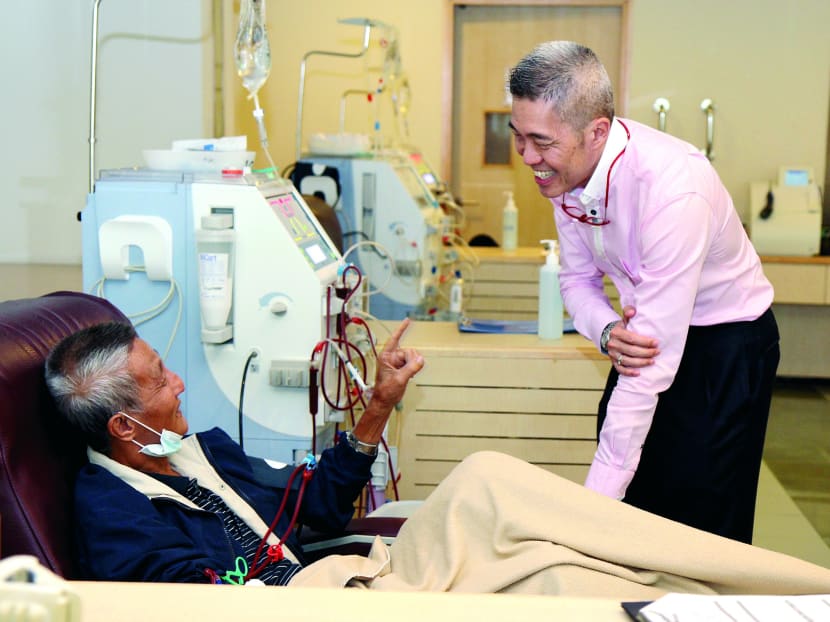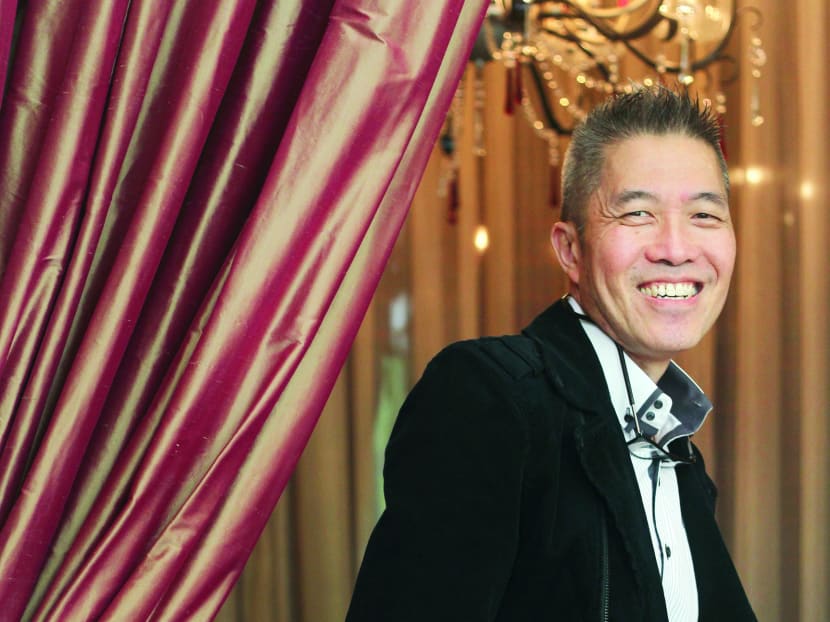Bulldog with a mission
For years, the tradition had been for army medics to practise injections on each other using distilled water. As a platoon sergeant, Mr Edmund Kwok switched to using saline solution instead — knowing it would be less painful for his soldiers.


For years, the tradition had been for army medics to practise injections on each other using distilled water. As a platoon sergeant, Mr Edmund Kwok switched to using saline solution instead — knowing it would be less painful for his soldiers.
Not one to mince words, he says: “You won’t die; distilled water just hurts a bit more as it’s not isotonic.” He adds: “I didn’t care what other people did, that’s not within my control; but what I can control, I do. If you take away the fear factor, the trainee won’t be thinking about how painful it is but he’ll be listening to you, understanding the principles, and therefore next time he will be able to give good injections to others.”
This can-do attitude is in part what spurred him to take over the helm of the National Kidney Foundation (NKF) from Mrs Eunice Tay.
Today is his 100th day as Chief Executive officially.
“Some people have asked me, ‘Why don’t you just volunteer?’ I think when you’re volunteering, you can’t quite change things. It’s good work, but it’s unlikely for you to say, ‘I don’t think this is right, I want to steer the organisation differently’.”
And asked if he’ll continue with Mrs Lee’s leadership approach, he notes quite candidly that “every leader has his own management style”. Laughing, Mr Kwok — who before this served as Mrs Tay’s Chief Operating Officer — says: “We are really as different as chalk and cheese. She always says that I have no protocol — anything also can.”
Since taking on the top job officially in November, the energetic Mr Kwok, 56, has wasted no time in putting his stamp on the way NKF is run. For a start, he makes it a point to make weekly rounds at the NKF’s 25 dialysis centres as a gesture of appreciation to his staff.
He says, over lunch at The St Regis Singapore: “I believe that you must genuinely care for them as a person and not as part of the machine that looks after the patients. Nowadays, when I visit ... they don’t even care that I’m there. But that’s nice, it’s a tell-tale sign that they are comfortable doing their work when I’m around.”
HUMBLED BY SICK AND POOR
Being on the ground also gives him the opportunity to interact with patients.
“When you have both illness and poverty, it’s a double whammy. As Singaporeans, we are relatively sheltered. We generally don’t need to worry about our next meal, but here you have people tapping welfare funds, wondering what tomorrow will bring.”
He cites the example of a patient who buys only leftover vegetables in order to stretch S$10, and of a family of seven that depends on one breadwinner working odd jobs to earn a few hundred dollars a month.
And yet, their positive attitudes have humbled him.
He says: “They struggle with dialysis, with poverty, with things that you don’t quite understand. But when they see me, they shake my hands and say thank you ... they are so grateful for the things that they have. You think you are here to help them, but at the end of the day, you go home being the one who’s helped.”
NOT WALKING ALONE
To help new entrants adapt to life as a kidney patient, Mr Kwok started the patient-advocacy programme last May, where patient-counsellors visit the dialysis centres to engage and encourage their fellow patients.
“What other stronger voices can we have? I can say to a patient, ‘You’ve got to take care of your health, and the fella will say, you don’t understand what this is like.’ And honestly, I can appreciate some parts of it, and I can sort of empathise, but understand? I can’t claim it.
“But here you have a patient who is positive, exercising and generally fit …except for the carbuncles that you see on their arms, you have a living example standing in front of you saying ‘I can, then so can you’.”
There are currently more than 80 patient-counsellors; a number which he hopes will reach 200, and eventually envisages will become a one-to-one system.
“Can you imagine if you have a buddy who walks you through the journey so you’re not walking alone? When we are surrounded by people who love and care for us, we are also motivated to press on,” he says.
‘A LITTLE OCD’
He softens what might seem a management cliche of distilling his mission into five Ps — patients, people, passion, purpose and processes — by prefacing it with a self-deprecating jibe: “Don’t mind me, I’m a little OCD, I like to categorise things.”
To add “colour” to patients’ lives, he began a monthly series of treating them to opera performances or movie screenings — and this soon branched into dancing and karaoke competitions.
Describing some of the sweetly poignant moments he has witnessed, like the patient whose husband stood by holding her hand as she sang, he says: “I’m quietly pleased about how it impacts the patients — I sometimes just sit down and smile remembering their happy faces.”
Leaning back from the table, he adds in mock-jest: “So, how can you say that this job is not a meaningful one? Actually, there should be people queuing up to take over my position, because it is very rewarding. You see and touch patients’ lives.”
Mr Kwok’s father died when he was 10, leaving his mother to single-handedly bring up two sons.
He did not feel that it impacted him negatively growing up. “Whatever you are, you just make the best out of the situation. I don’t remember being disadvantaged in any way.”
After graduating with a diploma in management in 1987, the Anglo-Chinese School boy began his career as a SBS Transit transport planner, before joining the healthcare sector in 1991 as manager for the admissions department at Tan Tock Seng Hospital (TTSH).
“One job helps healthy people move around, the other one helps sick people. Maybe I have a greater affinity for helping the sick,” he says with a laugh.
FROM PROFITS, TO PEOPLE FIRST
Over the past two decades, he served as Director at the Institute of Mental Health and TTSH, before becoming part of the team that set up Parkway Cancer Centre in 2006. He was Parkway Healthcare’s Vice-President of oncology before joining the NKF.
Describing the shift from the private sector to a charity organisation as “moving from one end of the world to another”, Mr Kwok admits that he now feels a greater sense of responsibility towards his patients and stakeholders.
“In the commercial world, it’s very clear, even if you bust your budget, but you bring back even more (money), who’s going to say ‘no’ to you? But here, many of the donors actually sacrifice to give, and if you are very frivolous with the way you do things, how are you ever going to face them?
“So, I feel that we should be even more exacting with ourselves in terms of standards — we have to make ourselves not just efficient, but effective.”
Trotting out the numbers for this financial year, Mr Kwok says that about S$61 million of the organisation’s S$70 million budget will go directly to patient care. The rest — 13 per cent — which goes towards administrative overheads comes from government grants and NKF’s recurring incomes.
He says: “I think that’s important because people give not to fund the organisation; people give so that patients can have life and hope. We must always remember one thing: The money is not ours. We are merely stewards helping people to channel it correctly ... would you not try and make sure it is well spent?”
DON’T BECOME OUR PATIENTS
According to the NKF, an average of four new kidney failure cases are diagnosed each day, up from three in 2008.
Not only has the number of kidney patients increased, the organisation has also had to deal with an ageing population, which means more complications and a greater need to look into resources catering to less-mobile patients.
With these factors, costs to treat each patient increase from S$20,000 a year to about S$23,000, with more need for trained manpower, says Mr Kwok.
Which is why stepping up education, awareness and prevention is on his agenda.
“The leading causes of kidney failure is diabetes or hypertension ... these are lifestyle choices which can be changed, if only people would watch what they eat.”
As a keen advocate, Mr Kwok — who has cut out the sugar in his daily cup of coffee — encourages people he meets to mind their diets and lead an active lifestyle. He jokes: “I had half a mind to wear a t-shirt that says, ‘We don’t want you’ in big, bold print, and in smaller print below, ‘to be our patients’.”
His enthusiasm has rubbed off on his 25-year-old son, who graduated with honours in tourism and hospitality management last year.
“I’ve been trying to convince him to go into the healthcare line instead of dealing with happy people all the time. Initially, he told me, nah. But as he was doing his thesis, he said, ‘Dad, maybe I should do medical tourism, at least it’s meaningful.’ When I heard that, I said, ‘I must have done something right somewhere along the line.’”
His daughter is pursuing psychology.
Pausing over his healthy meal of steamed cod fish, Mr Kwok says with a grin: “I talk too much, but you realise I keep going back to my messages right? Because I’m OCD, I’m very focused ... I’m like a bulldog, once I bite, I don’t let go.”
A case in point: During the photoshoot, when TODAY photographer Don Wong admits to liking his cigarettes, Mr Kwok urges him to quit, promising to remind him about it later. And sure enough, after the interview, he follows it up with a text message.
Says the dogged advocate: “We must always find ways to keep hounding and pounding this message into the community. If we can keep people as people, and not as our patients, it will be wonderful.”






